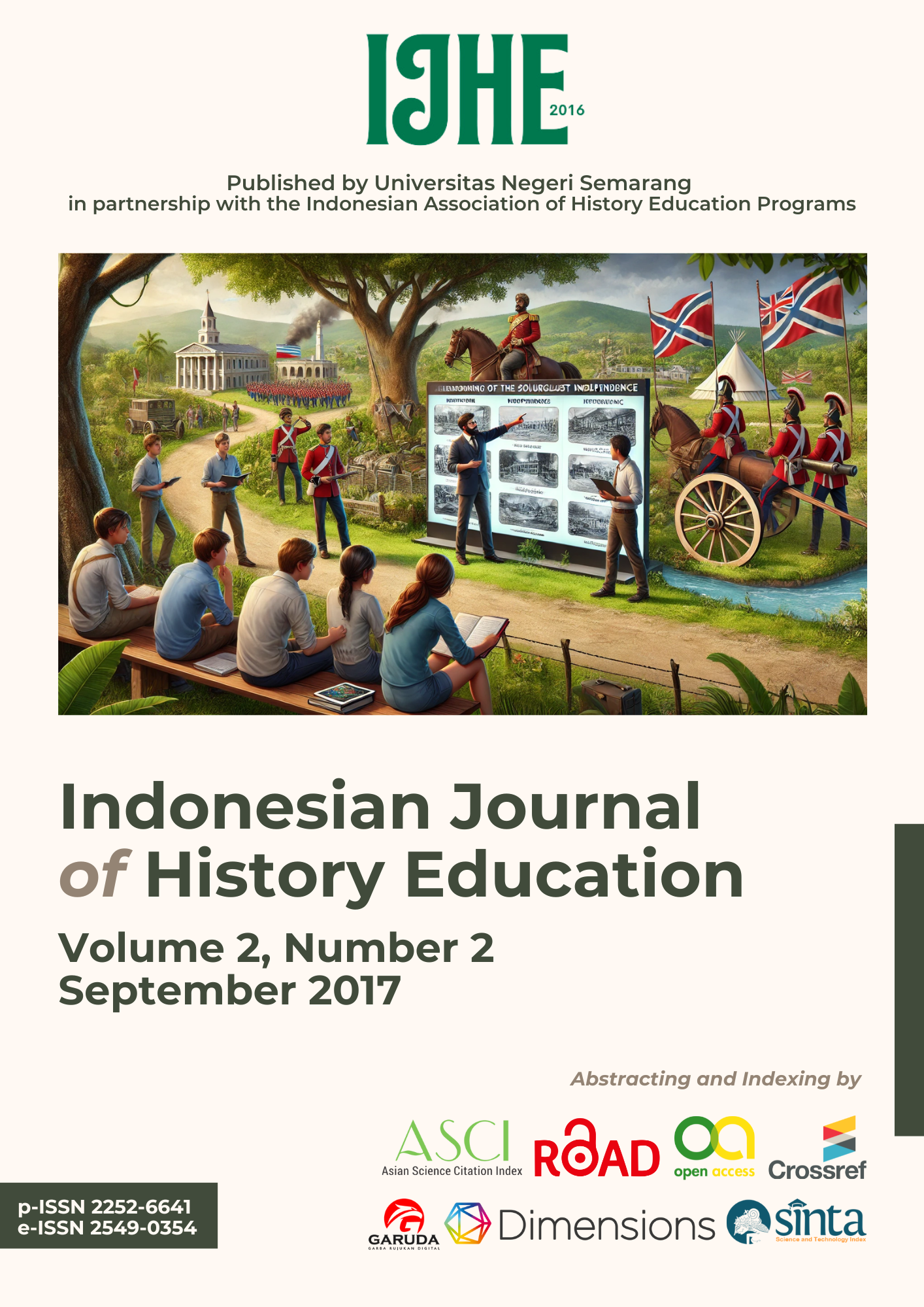Soekarno's Political Attitude Towards the Masjumi Party 1957-1960 as a Learning Resource for History Subjects
Abstract
The purpose of this study was (1) to understand the political attitudes of Sukarno in overcoming political gridlock, (2) to understand the Party's attitude towards Soekarno Masjumi during Guided Democracy, (3) to know Masyumi's reaction to changes in Sukarno 'ss political attitudes. The research method is the historical method, which goes through the steps of heuristic, source criticism, interpretation, and writing of history or historiography. The results of the study concluded the following: (1) Soekarno's attitude in overcoming political gridlock was by issuing a Presidential Decree that was declared on July 5, 1959, back to 1945; the decree is also the starting point to show the passing of Sukarno's Guided Democracy as an authoritarian leader. (2) Party Masjumi, considered by Soekarno as a counterrevolutionary group, often gets 'castration of politics" and is finally dissolved by Presidential Decree No 7/1959 and Presidential Decree No.200/1960. (3) Party Masjumi responds to the changing political attitudes of Soekarno by always showing opposition to Sukarno's measures, policies, and leadership.
References
Anwar Sanusi, A. S. (2013). Pengantar Ilmu Ilmu Sejarah.
Azizah, N. (2014). Dilema Demokrasi Liberal: Hambatan Normatif, Institusional Dan Praktikal Dalam Pemberlakuan Kuota Perempuan Di Indonesia. Jurnal Hubungan Internasional, 2(2), 184-197.
Budhiati, I. (2013). Quo Vadis Demokrasi Prosedural Dan Pemilu: Sebuah Refleksi Teoritis. Masalah-Masalah Hukum, 42(2), 268-273.
Budiardjo, Miriam.1989. Dasar-Dasar Ilmu Politik. Jakarta: Pt Gramedia.
Ghazali, Z., Riama, E., & Said, Y. (1998). Tokoh Pemikir Paham Kebangsaan Prawoto Mangkusasmito, Wilopo, Ahmad Subarjo. Direktorat Jenderal Kebudayaan.
Haidar, F. (2013). Prawoto Mangkusasmito Dalam Perjuangan Politik Di Indonesia (1945-1970) (Doctoral Dissertation, Universitas Negeri Jakarta).
Hakiki, P. (2011). Sistem Pemerintahan Pada Masa Demokrasi Liberal Tahun 1949-1959.
Harian Suara Merdeka, Edisi Jum'at 30 Juli 1959
Hermayati, N. F. (2012). Upaya Nasakomisasi Tni-Ad Dan Dampaknya Pada Situasi Politik Indonesia Tahun 1960-1967 (Doctoral Dissertation, Universitas Pendidikan Indonesia).
Indrajat, H. (2016). Demokrasi Terpimpin Sebuah Konsepsi Pemikiran Soekarno Tentang Demokrasi. Sosiologi: Jurnal Ilmiah Kajian Ilmu Sosial Dan Budaya, 18(1), 53-62.
Karim, Rusli. 1983. Perjalanan Partai Politik Di Indonesia, Sebuah Potret Pasang Surut. Jakarta : Cv Rajawali.
Lembaran Negara Republik Indonesia No. 75. 1959, Tentang Dekrit Presiden Republik Indonesia Kembali Kepada Undang-Undang Dasar 1945
Maarif, Ahmad Syafii.1996. Islam Dan Politik ; Teori Belah Bambu Masa Demokrasi Terpimpin (1959-1965). Jakarta: Gema Insani Press.
Noer, Deliar. 1987. Partai Islam Di Pentas Nasional 1945-1965. Jakarta: Grafiti Pers.
Pratiwi, S. E. (2016). Pembubaran Partai Politik Di Indonesia Pada Masa Demokrasi Terpimpin. Avatar, E-Journal Pendidikan Sejarah, 4(3).
Puji, R. P. N., & Ahmad, A. R. (2015). Gaya Belajar Dan Kemahiran Pemikiran Sejarah Dalam Pembelajaran Sejarah Di Peringkat Universitas. Edusentris, Jurnal Ilmu Pendidikan Dan Pengajaran, 2(3), 253-263.
Ricklefs, Mc. 2005 .Sejarah Indonesia Modern. Yogyakarta: Gadjah Mada University Press
Rosidi, Ajip. 2011. Sjafruddin Prawiranegara Lebih Takut Kepada Allah Swt. Jakarta: Pustaka Jaya
Siregar, I. F. (2013). Sejarah Pertumbuhan Dan Perkembangan Partai Masyumi (1945-1960). Thaqafiyyat: Jurnal Bahasa, Peradaban Dan Informasi Islam, 14(1), 88-103.
Sjamsuddin, Nazaruddin (Ed). 1988. Soekarno Pemikiran Politik Dan Kenyataan Praktek. Jakarta: Cv Rajawali.
Soyomukti, N. (2010). Soekarno Otoriter. Yogyakarta: Garasi
Sumanto, A. (2016). Perkembangan Politik Partai Masyumi Pasca Pemilu 1955. Risalah, 1(3).
Suryanegara, Ahmad Mansyur. 2010. Api Sejarah 2. Bandung: Salamadani.
Wardah, E. S. (2014). Metode Penelitian Sejarah. Tsaqofah, 12(2), 165-175.Vbxn.
Copyright Notice
An author who publishes in the Jurnal Indonesian Journal of History Education agrees to the following terms:
- Author retains the copyright and grants the journal the right of first publication of the work simultaneously licensed under the Creative Commons Attribution-ShareAlike 4.0 License that allows others to share the work with an acknowledgement of the work's authorship and initial publication in this journal
- Author is able to enter into separate, additional contractual arrangements for the non-exclusive distribution of the journal's published version of the work (e.g., post it to an institutional repository or publish it in a book) with the acknowledgement of its initial publication in this journal.
- Author is permitted and encouraged to post his/her work online (e.g., in institutional repositories or on their website) prior to and during the submission process, as it can lead to productive exchanges, as well as earlier and greater citation of the published work (See The Effect of Open Access).
Read more about the Creative Commons Attribution-ShareAlike 4.0 Licence here: https://creativecommons.org/licenses/by-sa/4.0/.




